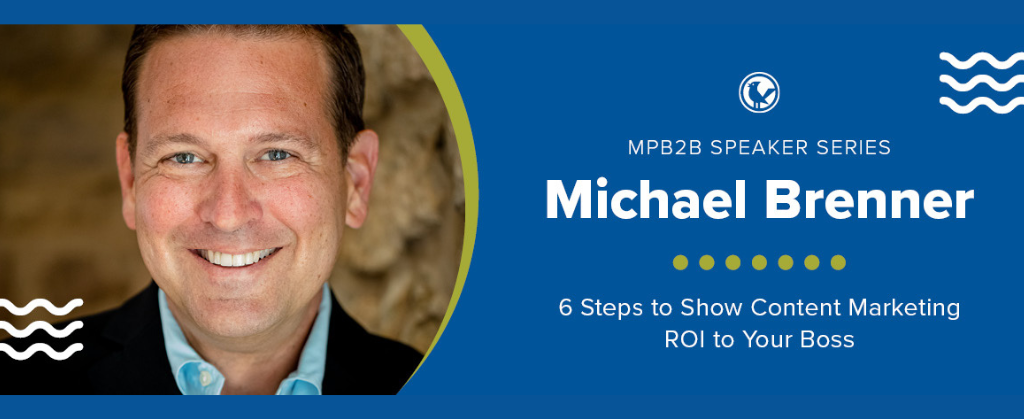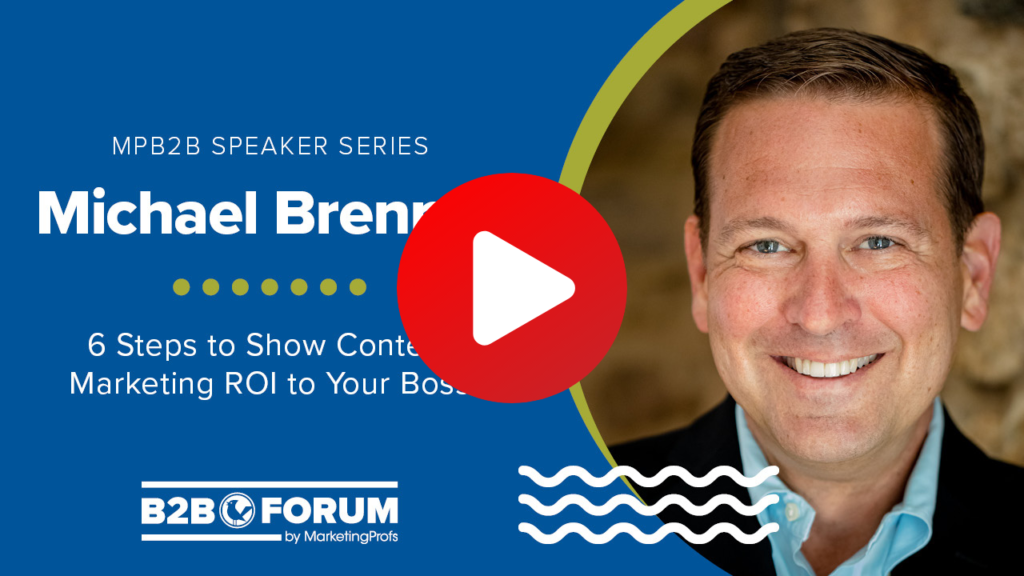
Marketers tend to throw a lot of things at the wall, to see what sticks.
But Michael Brenner, founder of Marketing Insideer Group, doesn’t believe in random marketing.
More than 60% of web visits come from organic search, says Michael, meaning our content marketing has a much higher ROI than other efforts.
In his presentation from B2B Forum 2023, Michael lays out six steps to prove content marketing ROI to your boss. In this clip, he discusses the importance of compounding your content to rank higher in search results—and attract prospects through useful content.
Watch the clip or read the transcript below. And for more insightful and inspirational ideas on improving your own marketing, join us at B2B Forum in November 2024. You’ll get inside information from dozens of B2B marketing experts on topics including content marketing, SEO, leadership, AI, and so much more. Tickets and discounted hotel rooms are available now.

You asked me, if I could go back to when I was 20 years old, what’s one piece of advice I wish someone had given me?
It was to start investing in my 401k sooner, with more money.
Why?
Because compounding rates of return. Consistency wins in life.

I wish I ran the Berlin Marathon. But if I was going to win the Berlin, or run the Berlin Marathon, I wouldn’t just go out and run 26 miles. I would start with a mile, and then two miles.
So consistency is what allows us to achieve our goals in life.
And consistency wins in marketing more than anything else.
This is my favorite chart, because it just shows the simple math that when we go from inconsistent [marketing] to always-on (or consistent) marketing, we can see better results.
Not just in the form of traffic to our website.

But in the form of leads, in the form of sales, in the form of revenue that we can show to our boss.
And there’s this sort of inflection point.
When we get two-times-a-week up to four-, even five-times-a-week… so almost daily… somebody usually asks me, “well, is there a diminishing return? Can you create too much content?”
The answer is, no!
If you’re analytical, you can see this chart doesn’t trail off. It keeps going.
That’s why SEMrush is spending $30,000 a month on content.
I know that because they’re killing me. Because I spend three [thousand dollars].
Because there’s no diminishing return on the amount of customer focused content you can publish on your website if you’re looking to get results like traffic and leads.
We measure this for our clients.
So this is just kind of a quick animated gif.
I created my first animated GIF… GIF or GIFf? Okay. It’s an animated… (Oh shoot. How many GIFs in the room right here? Sorry. Nope. GIFs win.)
Alright, this is my first animated GIF.

So basically what we’re showing, and what we’re able to demonstrate for our clients, is that consistency wins.
They’re gaining authority. They’re gaining visibility. They’re getting leads.
They’re showing an ROI from their consistent investment in customer focused content. Alright?
Not only are they winning, but they’re beating their competition.

We pick the hardest keywords. We want to show [our clients] that they stink!
They really suck when it comes to how well they rank, and how much traffic they get, relative to the competition.
Every single one of our 25 clients go from last position… to first position.
So it’s not just about return on investment.
We need to tap into the competitive nature of our executives and show them that we can win relative to our competition.
Not only can we bring ROI to the conversation, but we can tap into that sort of natural competitive instinct.
And it wins over time.

So we do this for a year, and then we reset.
We pick another 50 or a hundred hard things to do relative to the competition, which bumps our clients down to the last position in their market.
And then we create a year’s worth of content. They publish it every single week and they go up to the number one position.
And we repeat this year after year after year.
So not only are we winning and showing ROI, we’re beating the competition.
We have to become notable.
And this is especially true in the AI driven world that we’re in.
You’ve all heard of “double eat”? Yes, everyone’s heard of EEAT, right?

We need experience. We need expertise. We need authority in order to build trust.
Trust is the key metric that Google’s now using to understand whether we should rank for search, whether we should show up when our audience is searching for the challenges, the questions that they have.
I think everything in life can be explained in a Venn diagram.
So this is my Venn diagram for content marketing. (If you don’t have your own Venn diagram, you can steal this one.)
On the left hand side is all the crap that we do, and I think it’s important. It took me a long time to try to figure out, “why do we create so much content that never gets used, or that stinks when it does get used?”
…It’s our own natural instinct.
I think most of us wake up, and maybe you don’t love your company… Maybe some of you do. Who loves your company? Good for you. Good for you.
Okay, well for the rest of us, maybe you just like your job, you like paying your fricking mortgage, right?
So for us, even still, even those of us that don’t love our companies, still believe that marketing’s job is to promote the stuff that we do.
We have to resist that natural tendency!
We have to focus maybe a little bit more on our customers.

Now, on the right hand side is what your audience is actually interested in: pictures of babies and kittens and puppies.
And that’s entertainment. We can’t do that either because that’s charity.
That doesn’t drive revenue.
It doesn’t drive the ROI that our audience is looking for, that our bosses are looking for.
So, helpful B2B content is sort of this thing in the middle.
It’s answering the biggest questions on the minds of your audience with the expertise that you have, with the experience that you can share to build authority and trust that Google’s looking for.
That requires empathy.
How do we explain the importance of empathy to executives that have no empathy?
(See, again, that was a joke. You were supposed to laugh at that, but you didn’t. You’re all laughed out because of Andrew!)
You’re crying a little bit inside because it’s true.
Because we all work for that person, or have at some point, right?
How do we explain the importance of empathy to executives that don’t have any?
We have to “Jerry McGuire.” We have to show them the money.
Published May 22, 2024
B2B Forum is packed with marketing insights, strategies, and tactics taken from the real world experience of over forty industry experts, packaged into context you can actually put to use.
Join us in Boston for B2B Forum 2024 this coming November 12-14, 2024. Early buyers get B2B Forum tickets at their lowest rate, and discounted hotel rooms are available while they last.